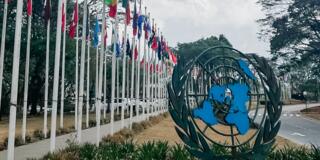Students Map Information Pollution in Kenya

For one of SIPA’s Spring 2023 EPD Workshops, a team of students examined mis- and disinformation at the behest of the UN Development Program. They recently shared reports from both Argentina and Kenya (below).
In March 2023, over SIPA’s spring break, we made a trip across the Atlantic to examine the mis- and disinformation landscape in Kenya. Our client, the United Nations Development Program (UNDP) and its Accelerator Labs (AccLabs) Network, asked us to map the information pollution landscape and develop a portfolio of potential solutions that the UN could leverage moving forward. The 91 AccLabs country offices serve as grassroots innovation hubs for development based on three core principles: (1) the experimentation of novel and innovative ideas, (2) solutions mapping, and (3) collective intelligence in international development.
Through interviews with experts, analysis of media coverage, and firsthand observations, we wanted to gain as comprehensive of an understanding as possible of the challenges faced by Kenyan citizens, policymakers, and other stakeholders in combating this issue. Over the course of our week in Nairobi, we met with a wide range of actors (journalists, educational institutions, fact checkers, UN staff, etc.) and gained insights into the complex dynamics at play.
Public discourse around mis- and disinformation in Kenya manifests primarily in the space of healthcare and elections. While meeting with UN staff, local partners, and university administrators, we found that the network of information pollution in Kenya is complex, and comprises more than a small number of bad actors acting on behalf of their own interests. Rather, mis- and disinformation appears on various platforms, including radio, WhatsApp groups, and television.
In our conversations with UNDP’s Deepening Democracy team, elections team, and AccLabs team in Nairobi, a few major points stood out. In the past years, UNDP’s primary focus during elections was to provide institutional support. However, with the prominence of mis- and disinformation during the COVID-19 pandemic, UNDP focused on mis- and disinformation by necessity. Because information pollution has now spilled over to other spaces, the Deepening Democracy team has focused efforts to address mis- and disinformation’s impact on electoral integrity as well.
The Deepening Democracy team took a three phase approach — before, during, and after — to tackle electoral integrity in the most recent Kenyan elections, in August 2022. However, a major constraint that the team faces is invitations by the Kenyan government. The UN, famously an apolitical body, cannot act on electoral integrity until they get formal permission from the Kenyan government. Given that the team was invited in July 2022, they had about a month’s time to produce a framework that would tackle information pollution in the election cycle.
AccLabs have piloted several tactics to fight mis- and disinformation in Kenya. A common initiative across several country offices that we came across in our desk research was the gamification of media literacy training. Gamification seeks to engage users while also training to identify misleading news, whether it is intentional or unintentional. In an effort to connect with a broader audience, AccLabs has also partnered with local content creators on other social media platforms to create awareness of information pollution.
Engaging with the local community also presents itself in the form of crowdsourced moderation platforms such as iVerify, a browser plugin that aims to identify incorrectly reported information to users. FInally, AccLabs staff shared with us details of their partnership with Google Ads to work together and reduce the prevalence of incendiary article headlines that simply aim to get more clicks. A frequent theme in our conversation with AccLabs was the fact that tech companies should bear some responsibility for being agents in the spread of mis- and disinformation.
In our discussions with local and regional partners, we discovered three main drivers of misinformation in Kenya, and East Africa more broadly. First, low earnings encourage many journalists to produce poor quality media for the highest bidder — or even leave journalism altogether for high-paying public relations roles at institutional producers of misinformation. This leads to the second discovery: Entrenched people and institutions with strong political or financial interests are perceived as the primary producers of misinformation in Kenya. And third, there is a significant amount of non-English and tribe-based misinformation in local languages that circulates unchecked except by poorly funded fact-checkers. These three factors contribute to — as we were told in our discussions — a “highly sophisticated” misinformation ecosystem in Africa that engages offline and online modes of circulation, legacy media and small-time publications, and traditional as well as innovative tools and methods of mis- and disinformation.
We had three major takeaways from our time in Nairobi. Many local and regional organizations are looking for the UN to coordinate partnerships. UNESCO has already taken the lead with their recently launched Kenya National Coalition on Freedom of Expression and Content Moderation, but organizations are hoping to leverage the UN’s scale and influence to more effectively build strategic partnerships in this space. Second, the consensus is that misinformation spreads offline as much as it does online, and therefore there need to be offline solutions as well that reach those that are not so constantly plugged into the internet. Finally, there is some demand for regulatory solutions either locally or in the US that would hold tech companies accountable for the impacts their platforms have in places like Kenya. Local actors feel as though unless it is an election year, the major tech companies express no regard for the effects of their platforms on non-Western communities and locales; as it was put to us in one interview, “we don’t feel seen.”